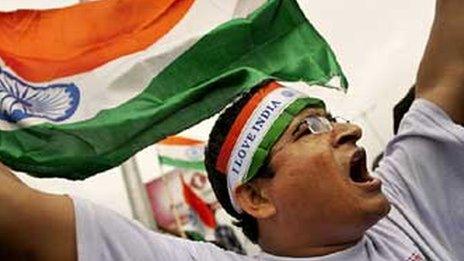Has the Indian parliament lost its relevance?
- Published
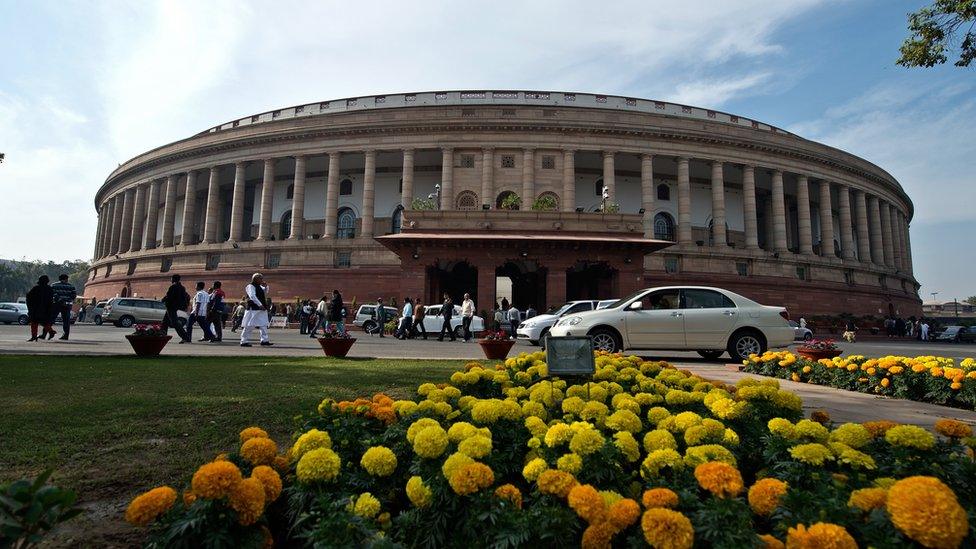
Prime Minister Narendra Modi's BJP has a majority in the lower house of parliament
Many Indians believe that the nation's parliament, beset by legislative gridlock and routine physical disruption, has lost its relevance. They are right, but only partially.
Elections to parliament's lower house, the Lok Sabha, are still crucial to determining who governs India. No one questions the legitimacy of the electoral process.
Over nearly seven decades, India's Election Commission has successfully run free and fair polls, and in fact has continually managed to improve the process.
Nevertheless, despite Prime Minister Narendra Modi's Bharatiya Janata Party (BJP) sweeping 2014 elections with the first single-party Lok Sabha majority in three decades, his government's agenda has been stymied.
The biggest hurdle is the government's lack of a majority in the second chamber of India's bicameral legislature, the Rajya Sabha (upper house).
A third of its members are elected every two years - not by the public but by state legislators, which tends to make it more representative of an earlier public mood.
But like the House of Lords before it was reformed in 1911, the Rajya Sabha can delay bills passed by the Lok Sabha (other than money bills), and also totally block them.
That is exactly what has been happening, with all government legislation stranded in the upper house, where the Congress party, though reduced to a rump in the Lok Sabha in last year's elections, still wields much clout. For the time being, the government can do precious little other than wait for elections to the Rajya Sabha in 2016 and 2018 and hope to alter its balance.
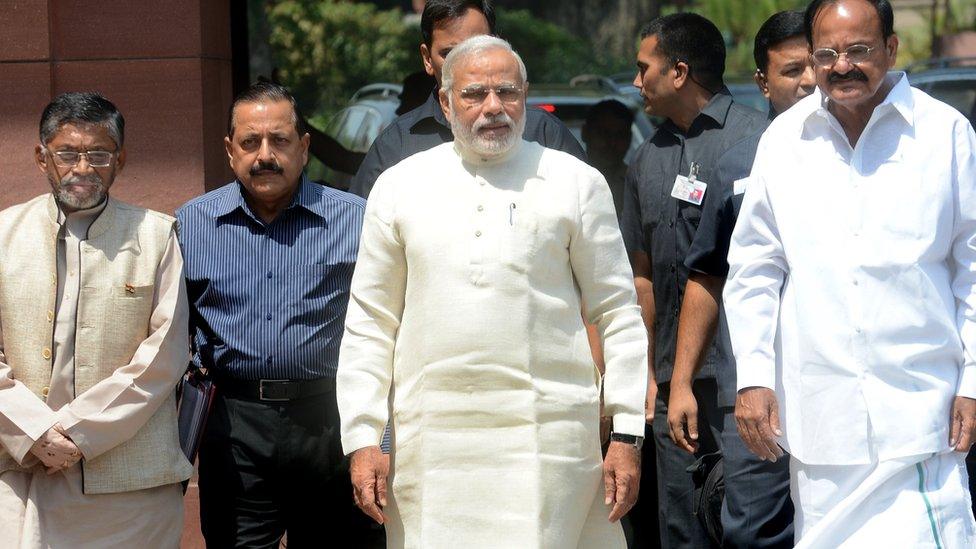
Prime Minister Narendra Modi, centre, has tried to reach out to the opposition in the winter session of parliament
But what is ironic is that even in the Lok Sabha, where the government has a comfortable majority, it often fails to get its way.
This is because of a culture of disruptions by opposition parties that has increasingly become the norm in recent years.
There are rules, of course, for maintaining discipline in the house, but they are rarely enforced. In fact, on the rare occasions speakers have suspended members for disruptions, they have faced harsh criticism.
This means that the Congress, with only 45 seats in the 543 member Lok Sabha often makes a ruckus and prevents the house from functioning, much like the BJP used to do when it was in the opposition. Other smaller parties are no slouches at this, either.
'Acrimonious stalemate'
What all this has led to is an excruciatingly slow process of legislating big policy decisions, with months and even years of acrimonious stalemate in parliament, interspersed by the all too rare breakthrough. This has led to two consequences.
First, it leaves the government of the day scrambling to eke out executive decisions that will not require parliament's sanction.
More importantly, it creates a vacuum in governance that has increasingly been filled by an activist judiciary.
Even the Supreme Court has felt compelled to get involved in such micromanagement as stipulating measures for garbage disposal and cleanliness in housing colonies; settling parking rates and restricting the use of loudspeakers and firecrackers during festivals.
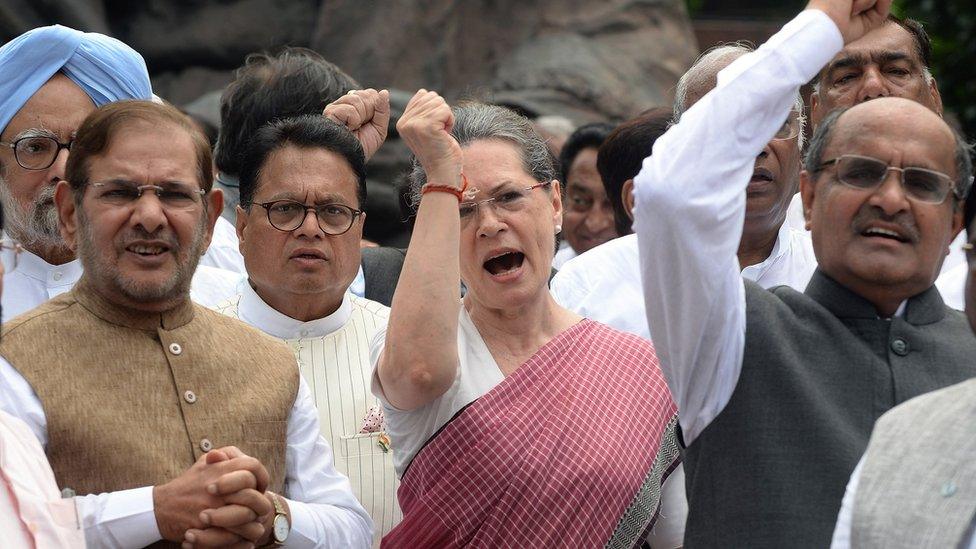
Sonia Gandhi-led Congress party has stalled some key legislations in parliament
This forfeiture of what is rightfully the role of the legislature disturbs the balance of powers between it and the other pillars of the constitution. It is thus no surprise that many have begun to wonder aloud about the relevance of parliament.
'Decisive governance'
Much of this grumbling comes from two categories of Indians: those from the business community and from the increasingly aspirational middle class.
The former envy the decisiveness of China, whose economy has gone from being about the same size as India's to five times larger, in a few short decades.
For despite having now overtaken China as the fastest growing big economy, doing business in India continues to be much more difficult for both domestic as well as foreign investors.
Similarly, the middle class, which author and former editor TN Ninan estimates is bigger than all other countries' populations except China's, is now global in its aspirations and access to information.
It feels frustrated at an India that self-handicaps its own immense potential and, thus, their prospects. They, too, yearn for more decisive governance and see parliament as a hurdle to that.
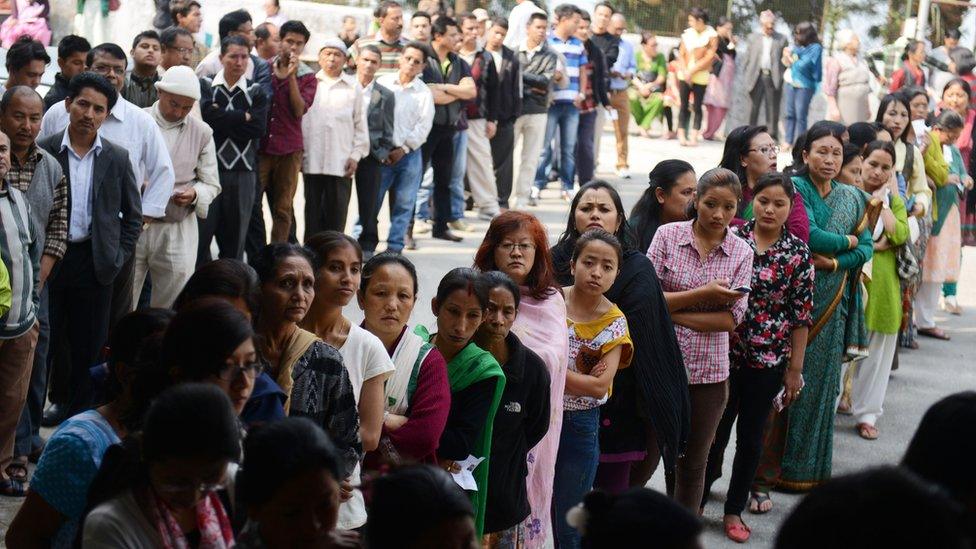
India's voters gave a clear majority to Mr Modi's BJP party in 2014 general elections
However, large as it is, India's middle class still constitutes a little more than a quarter of the population.
Moreover, it is relatively apathetic, with far lower voter turnout during elections than poorer Indians.
But this is changing. The middle class is growing rapidly, and increased activism against corruption and other issues has revitalised its engagement with the political process.
Soon, this could lead to middle class clout mattering in enough Lok Sabha constituencies to force MPs to start adapting to their sensibilities and expectations.
Earlier limited to public spats but private cordiality, we now see adversarial relationships overflowing into private bitterness.
That this is not as difficult to overcome, as was demonstrated last week by the prime minister reaching out to his predecessors. This seems to have led to parliament functioning better than expected this week.
But the deeper, systemic hurdles to rebuilding parliament's relevance are more complex and will take longer to fix.
Political reform in other democracies took decades of public debate and activism, and India is no different.
Baijayant Jay Panda is a member of parliament of India's Biju Janata Dal party
- Published29 March 2012
- Published22 November 2011
